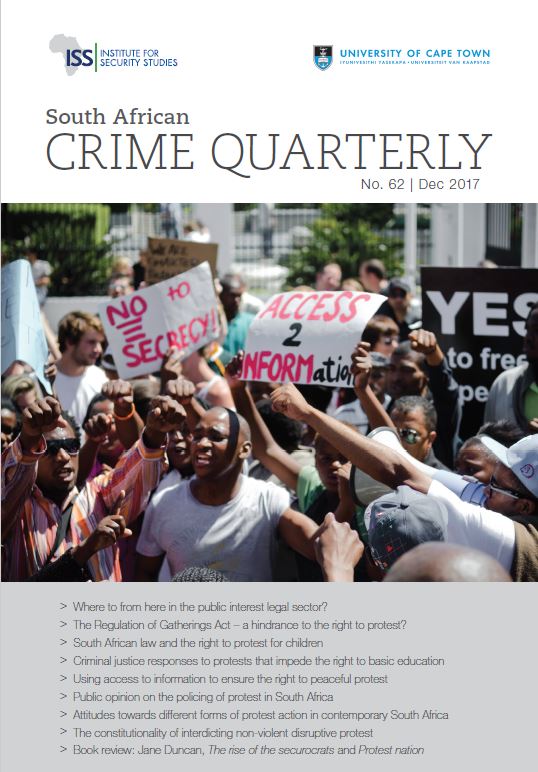Protest Blues: Public opinion on the policing of protest in South Africa
DOI:
https://doi.org/10.17159/2413-3108/2017/i62a3040Abstract
The policing response to rising protest action in the country has received increased attention in the last decade. This is particularly owing to concerns over confrontations during which protesters have been arrested, injured and in some instances killed by the police. Despite the criticism voiced by various stakeholders about the manner in which the police manage crowd gatherings, relatively little is known about the views of South African adults on the policing of protest action and the factors that shape such attitudes. To provide some insight, this article draws on data from a specialised module on protest-related attitudes and behaviour that was fielded as part of the 2016 round of the Human Sciences Research Council’s South African Social Attitudes Survey (SASAS) series. This nationally representative survey included specific questions probing the public’s overall evaluation of the performance of the police in dealing with protests, and the justifiability of the use of force in policing protest action. The article will present a national picture of people’s views on the policing of protest, based on these measures, and then determine the extent to which there are distinct underlying socio-demographic cleavages in these data. A combination of bivariate and multivariate analysis is undertaken in order to understand how perceptions of effectiveness, acceptability and reported participation in protest (especially disruptive and violent actions) shape people’s views regarding policing of protest. The article concludes with a discussion that reflects on the implications of the research for the policing of protest action in future, given the appreciable rise in the incidence of protest since the mid-2000s and the mounting tensions between state institutions and communities over the political, moral and constitutional arguments for and against such actions.
Downloads
Published
Issue
Section
License
Copyright (c) 2017 Author and Institute for Security Studies

This work is licensed under a Creative Commons Attribution 4.0 International License.
SACQ is licenced under a creative commons licence (CC BY) that allows others to distribute, remix, tweak, and build upon your work, even commercially, as long a they give appropriate credit, provide a link to the license, and indicate if changes were made. They may do so in any reasonable manner, but not in any way that suggests the licensor endorses you or your use.
Copyright for articles published is vested equally between the author/s, the Institute for Security Studies and the Centre of Criminology (UCT).



.png)